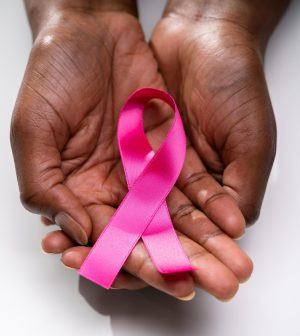- USDA Gets Tougher on Salmonella in Raw Breaded Chicken Products
- Fragments of Bird Flu Virus Found in 1 in 5 Milk Samples
- Clients Got HIV Through ‘Vampire Facial’ Microneedling Treatments
- Take the Stairs & Step Up to Longer Life
- ‘Drug Take Back Day’ is Saturday: Check for Leftover Opioids in Your Home
- Loneliness Can Shorten Lives of Cancer Survivors
- A Stolen Dog Feels Like Losing a Child, Study Finds
- Healthier Hearts in Middle Age Help Black Women’s Brains Stay Strong
- Better Scans Spot Hidden Inflammation in MS Patients
- Which Patients and Surgeries Are ‘High Risk’ for Seniors?
Hormonal Breast Cancer Therapy May Work Differently, Depending on Patient’s Race

For women with breast cancer, their race may help predict the success of hormone therapy given before surgery.
In a new study, researchers found that Black women treated with hormone therapy before cancer surgery (so-called “neoadjuvant endocrine therapy”) may be more likely to benefit from that treatment than white women are if they’re treated at an earlier stage. But they may be less likely to benefit than white women if treated at a later stage of disease.
“Our findings suggest that neoadjuvant endocrine therapy alone may not be the best approach in Black women who present with more advanced tumors,” said Dr. Veronica Jones, an assistant professor in the division of breast surgery at City of Hope in Duarte, Calif.
The research is being presented this week at the American Association for Cancer Research conference, in Philadelphia.
Breast cancers that produce estrogen and progesterone hormone receptors on cancer cells are typically treated with hormone therapy. That treatment can be done before surgery or after surgery. (Before surgery, it’s called neoadjuvant therapy.)
These types of cancer comprise about 70% of all breast cancer cases.
Nearly all patients with hormone receptor (HR)-positive breast cancer, regardless of race, are treated with hormone therapy. Yet Black women are four times more likely to die of HR-positive breast cancer than white women, Jones said in an association news release.
“We need to better understand if universal endocrine [hormone] therapy is the right approach, especially in a population that suffers a much higher mortality rate,” Jones added.
To do that, the researchers studied just over 3,500 white women and 365 Black women who were in the National Cancer Database. All had stage 1 to stage 3 HR-positive breast cancer and had received pre-surgical hormone therapy.
The research team found that at diagnosis, Black women were 1.6 times more likely to have cancer detected in their lymph nodes. They were also 1.5 times more likely to have stage 3 disease, as compared to white women.
Black women also received pre-surgical hormone therapy for longer than their white counterparts. The investigators found that Black patients had a median treatment time of 128 days compared with 114 days for white patients. Black women were 1.5 times more likely to receive this therapy for longer than 24 weeks.
Overall, Black women were almost three times more likely to experience tumor downstaging (meaning the cancer regressed to an earlier stage) or elimination than white women, the results showed.
The investigators found that all of the downstaged tumors were originally diagnosed as stage 1 or 2. However, 0.9% of tumors, most of which were diagnosed as stage 2 or 3, upstaged to stage 4.
For Black women this was more likely to lead to negative outcomes. They were 2.6 times more likely to experience tumor upstaging than white women, the findings showed.
“While lower-stage cancers in Black women responded better to endocrine therapy compared to white women, higher-stage cancers in Black women did more poorly in response to endocrine therapy,” Jones said, explaining the results. “This suggests a different tumor biology that may impact the treatment we give.”
There were limitations to the study. Percentages of estrogen and progesterone receptor positivity were unavailable. Also, the database did not include information on how well patients adhered to therapy or how clinical tumor stage was determined.
Studies presented at meetings should be considered preliminary until published in a peer-reviewed medical journal.
More information
The American Cancer Society has more on breast cancer hormone receptors.
SOURCE: American Association for Cancer Research, news release, Sept. 16, 2022
Source: HealthDay
Copyright © 2024 HealthDay. All rights reserved.









